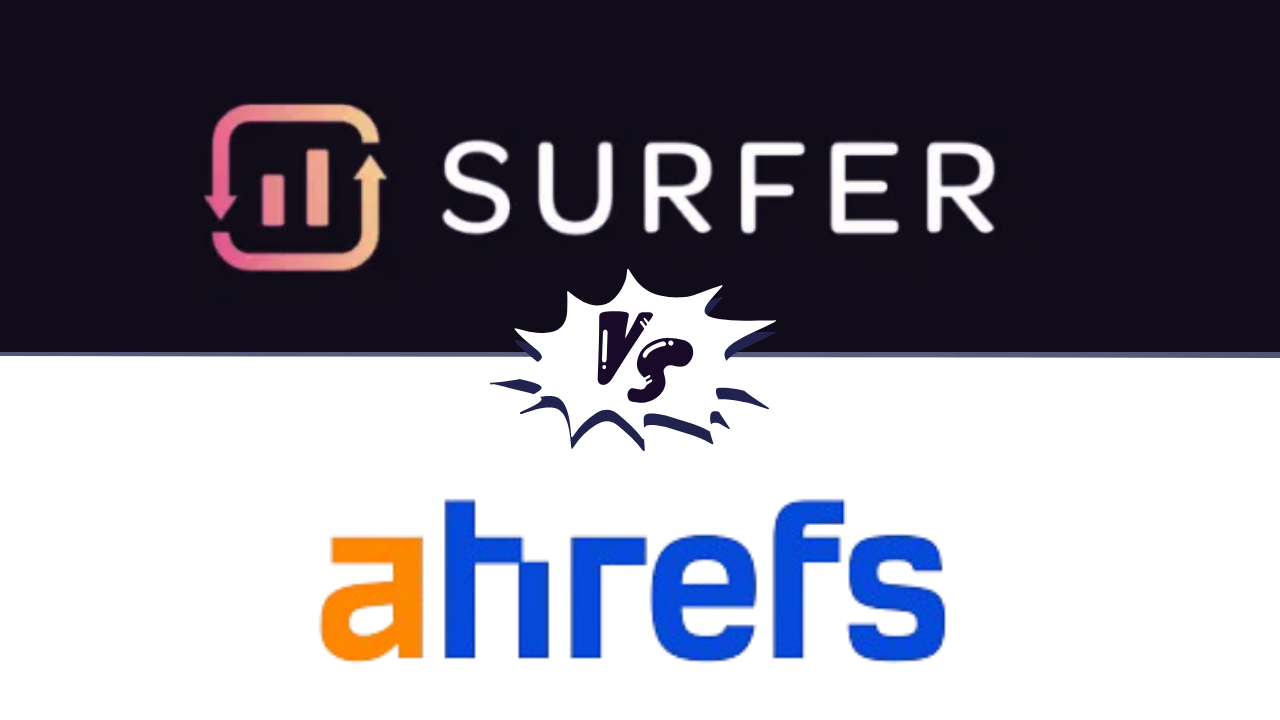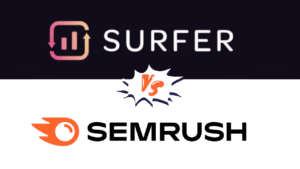Choosing between Surfer SEO vs Ahrefs can feel a bit overwhelming at first — especially if you’re just starting out in SEO or work in content and digital marketing. I’ve spent time researching and testing both tools — and while I haven’t had full access to every premium feature, I’ve taken a deep dive into what each platform offers, how they feel in day-to-day use, and who they’re really built for.
Here’s the most important thing to keep in mind:
Surfer SEO is focused on helping you write content that can actually rank. Think of it like having a smart SEO editor that tells you exactly what your article needs to compete on Google.
Ahrefs, on the other hand, is a more technical and powerful tool — perfect if you’re looking to research competitors, uncover backlink opportunities, or run full-scale SEO audits.
Both tools play a valuable role in a well-rounded SEO strategy. But depending on your role (writer, marketer, technical SEO, or entrepreneur) and your budget, one might make more sense for you than the other.

Table of Contents
Overview of Surfer SEO and Ahrefs
Comparing Ahrefs and Surfer SEO isn’t just about picking between two similar tools — in reality, they serve quite different purposes, even though they overlap at certain points in the SEO workflow.
Surfer SEO excels at on-page optimization and content planning. With tools like the Content Editor, SERP Analyzer, and Content Planner, it’s become a go-to for bloggers, content writers, and marketers who want their content to actually rank on Google.
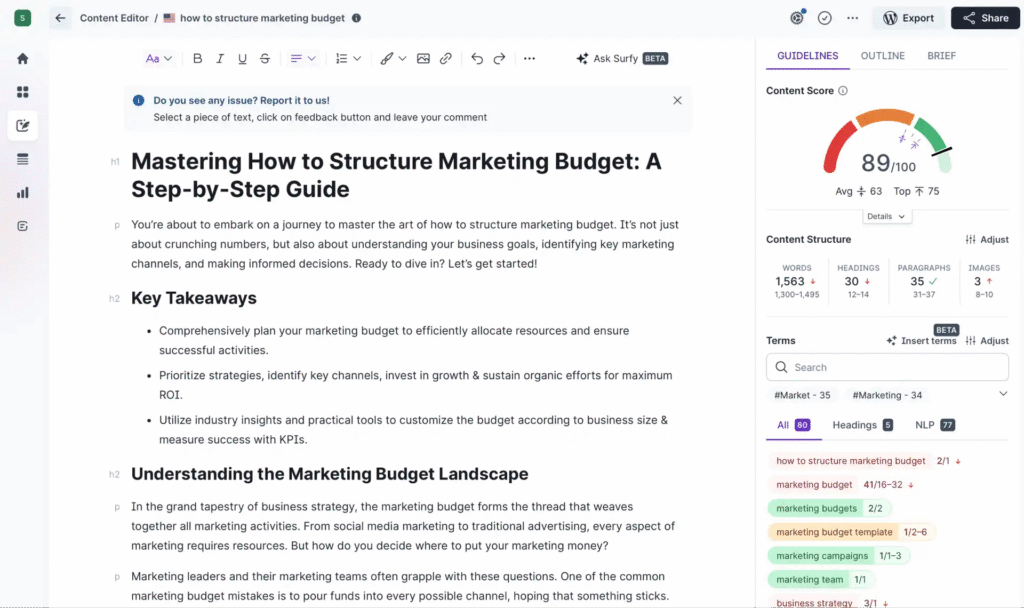
Ahrefs, on the other hand, shines in off-page SEO: backlink analysis, competitor research, and keyword tracking. Its backlink database is one of the largest available, making it a favorite among SEO professionals, agencies, and technical SEOs who need to understand their competitive landscape and build authority through link building.
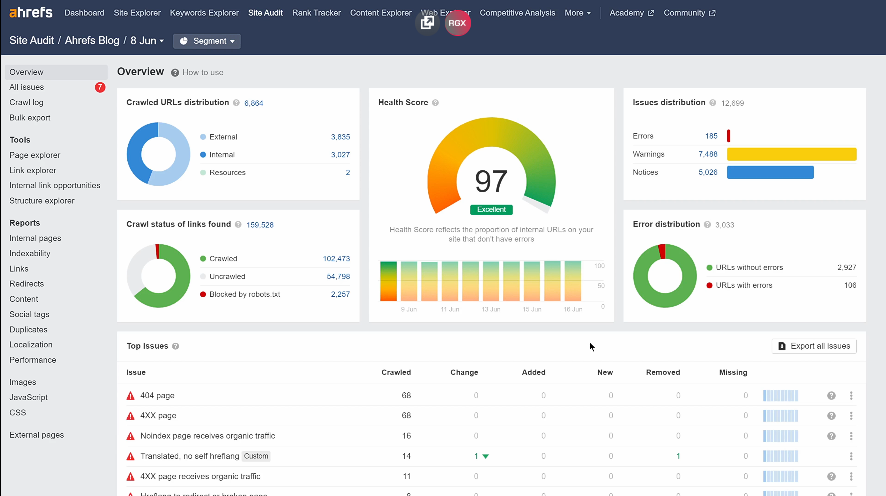
In simple terms: Surfer helps you optimize what you publish, while Ahrefs helps you figure out what to publish — and how to build the kind of links that boost your visibility.
Many SEO pros use both tools together: Ahrefs for research and link building, and Surfer for crafting content that’s built to rank.
User Interface and Ease of Use
When comparing Surfer SEO vs Ahrefs, one of the first things you’ll notice is how different the user experience feels — especially if you’re new to SEO.
Surfer SEO has a clean, modern, and minimalistic interface. The dashboard is easy to navigate, and tools like the Content Editor or Audit are clearly labeled and beginner-friendly. Real-time recommendations, visual content scores, and intuitive layouts make it an ideal choice for content writers, bloggers, and marketers who want to focus on ranking — without getting lost in technical details.
Ahrefs, on the other hand, offers significantly more power and depth — but it comes with a steeper learning curve. Its interface is packed with data: tabs, metrics, filters, graphs, and more. For beginners, it might feel overwhelming. But for experienced SEOs and digital analysts, this level of control is a huge advantage. Once you’re familiar with the platform, it becomes a powerhouse for competitive research, backlink analysis, and technical audits.
Bottom line:
If you value simplicity and speed, Surfer SEO is a great pick. But if you need advanced insights and don’t mind diving into data, Ahrefs gives you the tools to go deep.
Keyword Research Capabilities
One of the biggest differences in the Surfer SEO vs Ahrefs debate lies in how each tool approaches keyword research — arguably one of the most critical pieces of any SEO strategy.
Ahrefs is known for its powerhouse Keywords Explorer. It gives you access to massive amounts of keyword data: search volume, keyword difficulty, click potential, and even how many clicks each result actually gets — not just impressions. You also get thousands of related keyword ideas, matching phrases, and questions across Google, YouTube, Amazon, Bing, and more. For SEO pros who want to dig deep and build data-driven strategies, Ahrefs is hard to beat.
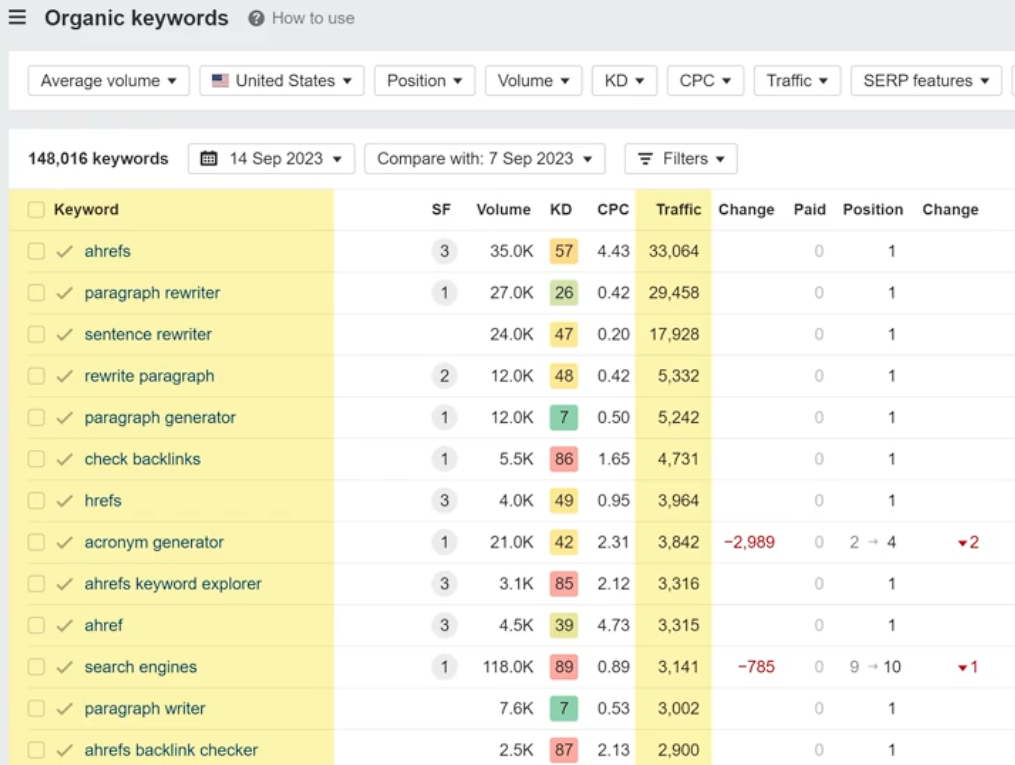
Surfer SEO, while not as extensive in raw keyword data, takes a different — more content-driven — approach. Its Keyword Research Tool and Content Planner focus on clustering keywords based on topical relevance. Instead of chasing search volume alone, Surfer helps you identify semantic relationships and content themes that reflect what Google currently favors. This makes it incredibly useful for building content that ranks — especially if you’re writing blog posts or optimizing landing pages
If you want deep keyword metrics and competitive analysis, Ahrefs is your go-to. If you’re planning SEO content and want to build smart, keyword-rich outlines, Surfer SEO makes that process smoother.
Content Optimization Features
When comparing Surfer SEO vs Ahrefs, one of the biggest contrasts is how each tool supports content optimization — especially during the writing process.
Surfer SEO is built with content creators in mind. Its standout feature, the Content Editor, analyzes the top-ranking pages for your target keyword and gives you real-time SEO suggestions as you write. Think of it as having an SEO assistant by your side — guiding you on ideal word count, heading structure, keyword usage, and even NLP-based term suggestions. For writers, marketers, and bloggers, this creates the perfect blend of creativity and strategy without ever leaving the editor.
It doesn’t stop there. Surfer also includes a Content Audit tool that lets you evaluate existing content on your site, pinpoint gaps, and get actionable tips to improve your chances of ranking better.
On the other hand, Ahrefs takes a broader, more data-focused approach. While it doesn’t offer a content editor or real-time guidance, it provides powerful tools like Content Explorer and Site Audit. These help you find what’s already working in your niche — top-performing pages, backlink magnets, and keyword trends. However, you’ll need to optimize your writing manually or use an additional tool for in-line SEO improvements.
Bottom line:
If you want to optimize as you write, Surfer SEO is your best ally. If you’re more focused on content discovery, backlinks, and post-publish performance, Ahrefs takes the lead.
Backlink Analysis
When it comes to Surfer SEO vs Ahrefs, one of the most decisive differences is in backlink analysis — and this is where Ahrefs has a clear advantage.
Ahrefs is renowned for having one of the largest and most frequently updated backlink databases in the SEO world. Through its powerful Site Explorer, you can dive deep into any website’s backlink profile: view referring domains, anchor text distribution, historical link growth, broken links, and more. This level of insight is crucial for monitoring your own backlinks or uncovering your competitors’ link-building strategies.
What sets Ahrefs apart even further are proprietary metrics like Domain Rating (DR) and URL Rating (UR) — which help you quickly assess the authority and strength of any page or domain. Plus, with advanced filters (link type, platform, language, etc.), you can fine-tune your research for high-impact link-building campaigns or digital PR.
Surfer SEO, by contrast, doesn’t include backlink tracking or analysis. Its core strength lies in on-page optimization, so if backlinks are part of your SEO strategy, you’ll need to use it alongside Ahrefs or a similar tool.
In short:
If backlinks matter to you (and they should), Ahrefs is the go-to tool for deep, actionable link intelligence. Surfer simply doesn’t compete in this area.
Site Audit and Technical SEO
In the Surfer SEO vs Ahrefs debate, another key comparison lies in how well each tool handles site audits and technical SEO.
Ahrefs offers a robust Site Audit tool that performs a deep crawl of your entire website. It flags a broad range of technical SEO issues — including broken links, slow-loading pages, redirect chains, missing meta tags, duplicate content, crawlability issues, and mobile usability problems. The platform gives you an overall SEO Health Score, visual dashboards with charts and graphs, and prioritized recommendations to fix what matters most.
This makes Ahrefs especially valuable for SEO professionals, developers, and web managers who need to monitor and maintain a healthy, high-performing site.
Surfer SEO, by contrast, takes a more page-level approach. Its Audit tool analyzes a specific page against the top-ranking competitors for a given keyword, and provides on-page suggestions related to keyword use, content structure, internal linking, and content length. However, it doesn’t perform full website crawls or flag technical infrastructure problems.
Bottom line:
If your goal is to improve your website’s technical foundation, Ahrefs is the clear winner. But if you’re focused on tuning up individual pieces of content for better on-page SEO, Surfer SEO is more targeted and practical.
SERP and Competitor Analysis
One of the most important aspects of any SEO tool is how it helps you understand what’s ranking — and why.
Based on my research and testing (with limited access), I found that Surfer SEO vs Ahrefs approach this in very different ways.
Surfer SEO focuses on on-page SERP analysis.
With tools like the SERP Analyzer, Surfer breaks down the top-ranking pages for a keyword. You can see patterns in content length, how often certain terms appear, how many H2s are used, and so on. It doesn’t just give you a list — it gives you structure. That’s especially useful if you’re planning content and want to understand what Google seems to prefer.
For example, if you’re writing about “best running shoes,” Surfer might show that the top 10 results tend to mention words like “cushioning” or “mileage,” and typically include 8 to 12 subheadings.
Ahrefs, on the other hand, takes a broader, more strategic view.
Through tools like Site Explorer and Content Explorer, you can see which keywords your competitors rank for, how many backlinks each page gets, and what kind of topics attract the most traffic. Ahrefs is better for mapping out the competitive landscape — it’s not just about individual pages, but entire sites.
So if you’re trying to understand which content performs well across a whole domain, or spot gaps in your own content strategy compared to others, Ahrefs gives you the bigger picture.
My takeaway?
If you’re focused on writing and optimizing specific pages, Surfer gives you tactical insights.
If you’re doing SEO at a broader level — like researching competitors or planning your overall strategy — Ahrefs is the better fit.
And while I haven’t used the full premium versions of both tools, I’ve spent enough time studying their features, interfaces, and user feedback to understand their core strengths. Each one fits a different stage of the SEO workflow.
Content Planning and Strategy
When comparing Surfer SEO vs Ahrefs, content planning is another area where their differences are obvious — not just in features, but in how they expect you to work.
Surfer SEO takes a more guided, structured approach.
Its Content Planner starts with a single keyword and generates clusters of related terms. These clusters aren’t just random suggestions — they’re semantically connected topics that help you build out content hubs or pillar pages. If your goal is to build topical authority or cover a subject in depth, this is extremely useful.
Each cluster includes helpful info like search volume and difficulty. Even though I haven’t used the full paid version, from what I’ve seen, this makes it easier to plan a content strategy that actually aligns with how Google sees a topic — not just individual keywords.
Ahrefs doesn’t have a dedicated content planner, but it gives you the tools to reverse-engineer what’s already working.
Using Content Explorer, you can look up any topic and see the most popular pages by backlinks, traffic, or social shares. It’s more like a content research lab — you get raw data and trends, but it’s up to you to organize and plan with that information.
For example, if you’re brainstorming content ideas in a competitive niche, Ahrefs can show you which blog posts are earning the most links and traffic. Pair that with the Content Gap tool, and you’ll quickly spot opportunities your site is missing.
Which One Fits Better?
If you’re someone who wants a structured, easy-to-follow system to plan content around topics, Surfer SEO is the better fit. Its clusters are clear, organized, and designed to help you build content with topical authority — even if you’re not an SEO expert.
But if you prefer to analyze trends, dig into what’s working for others, and build your own editorial strategy based on traffic, links, and gaps, Ahrefs gives you more control and flexibility.
In my experience, Surfer is ideal when you want to move fast and stay focused on writing. Ahrefs shines when you want to step back and make data-driven content decisions based on what’s already working across the web.
Pricing and Plans
When comparing Surfer SEO vs Ahrefs, pricing is often a deciding factor — especially for freelancers, startups, and small marketing teams. Both tools offer tiered plans, but they differ significantly in price structure and what features are included.
Surfer SEO Pricing (2025)
Surfer SEO offers three pricing tiers, making it a flexible option for individuals, small teams, and growing agencies:
- Essential – $79/month (billed annually)
Designed for beginners and small teams:- Optimize up to 360 articles per year
- Generate 60 AI rank-ready articles/year
- Track 200 pages
- Invite up to 5 teammates
- Access to Keyword Research and Topical Maps
- Includes the Content Optimization Masterclass
- Scale – $175/month (billed annually)
Best for scaling teams and content production:- Optimize 1,200 articles/year
- Generate 240 AI rank-ready articles/year
- Track 1,000 pages
- Invite up to 10 teammates
- Analyze up to 100 SERPs/day
- Includes onboarding support and SEO journey guidance
- Also includes the Content Optimization Masterclass
- Enterprise – Custom pricing
For large teams or agencies:- Custom usage limits and teammate count
- White-labeling & API access
- Dedicated support and SEO consulting
- Rank Tracker + SSO integration (coming soon)
- Includes everything in Scale + more personalized service
All plans include Surfer’s signature Content Optimization Masterclass.

Ahrefs Pricing (2025)
Ahrefs is a more technical and data-rich SEO tool with higher-tier pricing, aimed at professionals and in-house teams:
- Lite – $108/month (billed annually: $1,290/year)
- 5 projects
- 6 months of historical data
- 750 tracked keywords
- 100,000 crawl credits
- 1 user included (add 2 more at $40/mo each)
- Standard – $208/month (billed annually: $2,490/year)
- 20 projects
- 2 years of historical data
- 2,000 tracked keywords
- 500,000 crawl credits
- 1 user included (add 5 more at $60/mo each)
- Advanced – $374/month (billed annually: $4,490/year)
- 50 projects
- 5 years of historical data
- 5,000 tracked keywords
- 1,500,000 crawl credits
- 1 user included (add 10 more at $80/mo each)
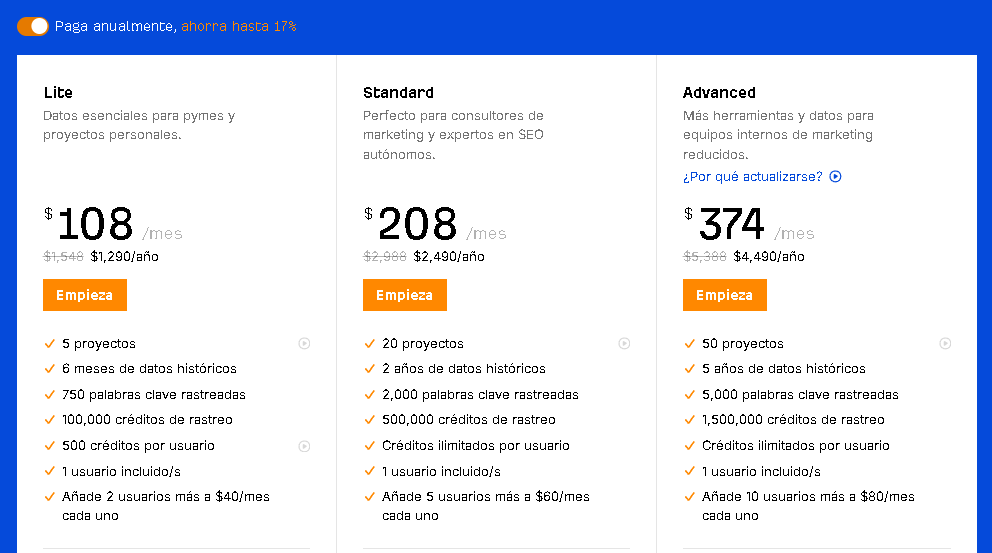
Ahrefs does not currently offer a free trial, but its plans provide deep access to backlink data, technical SEO tools, and competitive insights.
Final Verdict
In terms of Surfer SEO vs Ahrefs on pricing:
- Surfer SEO is better suited for content creators and teams focused on on-page SEO and content strategy.
- Ahrefs is ideal for SEO professionals who need deep technical, backlink, and competitive data — and are willing to invest more.
Integrations and Workflow Compatibility
When evaluating Surfer SEO vs Ahrefs, it’s important to consider how well each tool fits into your existing workflow. Integrations can significantly impact your productivity, especially if you’re working with content teams or managing SEO across multiple platforms.
Surfer SEO Integrations
Surfer SEO focuses heavily on content workflows, and its integrations reflect that. It connects with:
- Google Docs: Optimize content directly within documents using the Surfer SEO sidebar extension.
- WordPress: Use the Surfer plugin to push optimized content straight to your site.
- Jasper AI: Seamlessly combine AI writing with SEO optimization.
- Google Search Console: Sync data for enhanced keyword insights and performance tracking.
- Semrush (via keyword research): To enrich keyword suggestions inside Surfer’s interface.
These integrations make Surfer SEO ideal for content marketers, editors, and copywriters who want to stay in their preferred writing environments while optimizing for SEO.
Ahrefs Integrations
Ahrefs is more of a standalone powerhouse with limited native integrations, but it does provide:
- API Access (available in higher-tier plans): For developers and agencies to pull data into their own tools or dashboards.
- Google Data Studio: With third-party connectors, you can visualize Ahrefs data in custom reports.
- Slack/Zapier (indirectly): Via API, Ahrefs data can be connected to workflows, though it requires technical setup.
While Ahrefs doesn’t integrate directly with writing tools, it’s ideal for analysts and SEOs who need access to large datasets and prefer working outside of content platforms.
Surfer SEO vs Ahrefs: Workflow Comparison
- Surfer SEO wins in terms of content creation and editorial workflow compatibility.
- Ahrefs is better suited for technical SEOs, agencies, and developers who need API-based access or build their own reporting systems.
Accuracy and Data Freshness
In the comparison of Surfer SEO vs Ahrefs, data accuracy and freshness are critical—especially when you’re making decisions based on search rankings, backlinks, or content optimization.
Surfer SEO: Data Focused on On-Page and SERP Freshness
Surfer SEO relies on real-time SERP analysis and machine learning to deliver data that’s closely aligned with what’s currently ranking on Google. Here’s how it ensures fresh, relevant insights:
- Real-Time SERP Scans: Every content editor is built using live data from the Google search results for your target keyword.
- Content Score Updates: As you write or edit, Surfer constantly updates the SEO score to reflect the impact of your changes.
- Frequent Keyword Data Syncing: When connected with Google Search Console, Surfer can pull in fresh keyword performance data.
This makes Surfer ideal for content creators who want to optimize based on what’s ranking right now, not just historical trends.
Ahrefs: Industry-Leading Crawling and Indexing
Ahrefs operates one of the largest third-party web crawlers in the world—second only to Google. It updates its data frequently and at scale:
- Backlink Index: Updated every 15–30 minutes, making Ahrefs one of the most reliable tools for link building and backlink monitoring.
- Keyword Database: Covers over 171 countries, with regular updates to reflect SERP changes and keyword trends.
- Site Audit and Rank Tracker: These tools offer daily or weekly updates, depending on your plan settings.
- Historical Data: Up to 5 years of historical data is available in premium plans, which is highly valuable for long-term SEO analysis.
Ahrefs is the better choice if you need deep, reliable data at scale—especially for backlinks, competitive research, and keyword tracking over time.
Surfer SEO vs Ahrefs: Which Has Fresher Data?
- Surfer SEO excels in real-time SERP and on-page content data.
- Ahrefs offers unmatched scale and frequency in backlink updates, keyword databases, and crawling.
Which Should You Use: Surfer SEO or Ahrefs, and Why?
Choosing between Surfer SEO vs Ahrefs ultimately depends on your specific SEO goals, team setup, and budget. Both tools are powerful but serve slightly different purposes within the SEO ecosystem.
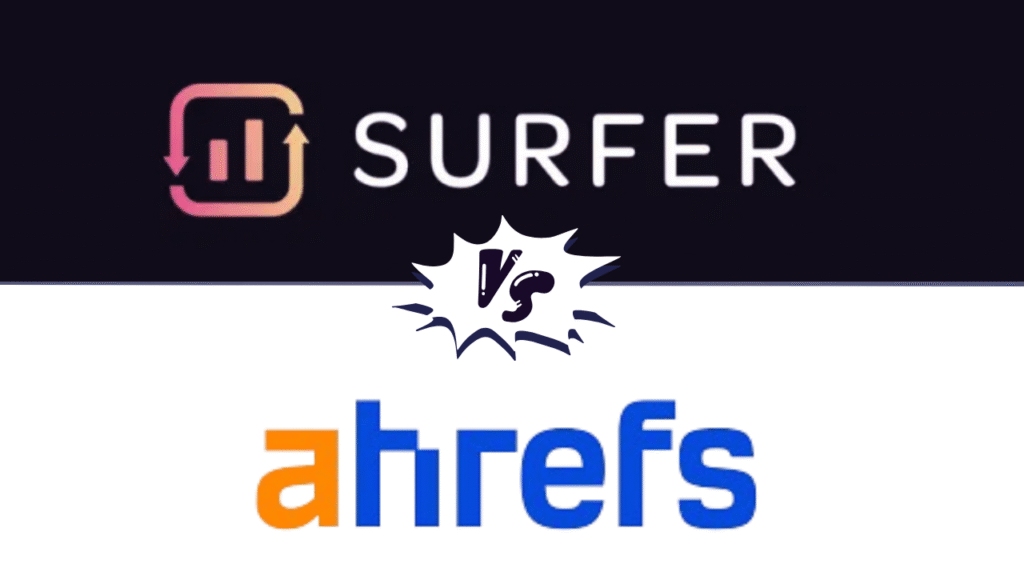
Use Surfer SEO If You…
- Are primarily focused on content optimization and want a tool that helps you write SEO-friendly content in real-time.
- Work in a content marketing team, agency, or as a freelancer aiming to scale content production efficiently.
- Need easy-to-use integrations with writing platforms like Google Docs or WordPress.
- Prefer actionable, on-page SEO recommendations based on live SERP data.
- Want a more budget-friendly option for optimizing content and planning topics.
Use Ahrefs If You…
- Need a comprehensive, all-in-one SEO tool that covers backlink analysis, keyword research, site audits, and competitive intelligence.
- Are an SEO professional, agency, or in-house marketer who requires deep data on backlinks and historical keyword trends.
- Want to run detailed technical SEO audits and monitor large websites or multiple projects.
- Value a large and frequently updated backlink index to support link-building campaigns.
- Don’t mind investing more for a robust SEO platform with extensive datasets.
Summary: Surfer SEO vs Ahrefs
- Surfer SEO excels in content-driven SEO workflows, helping you optimize and plan content with data-backed recommendations.
- Ahrefs stands out for its powerful backlink data, keyword intelligence, and technical SEO capabilities.
Your choice should be guided by whether your priority is content optimization (Surfer SEO) or comprehensive SEO analysis and research (Ahrefs).
Conclusion
When deciding between Surfer SEO vs Ahrefs, it’s clear that both tools offer unique strengths tailored to different SEO needs. Surfer SEO is an excellent choice for content marketers and teams focused on creating and optimizing SEO-friendly content with real-time data and seamless workflow integrations. On the other hand, Ahrefs shines as a comprehensive SEO platform ideal for professionals who need deep backlink analysis, extensive keyword research, and powerful site auditing capabilities.
Ultimately, your decision should be based on your specific goals, team size, and budget. Whether you prioritize content optimization or full-scale SEO research, understanding these differences will help you choose the right tool to boost your SEO strategy effectively.
Still comparing SEO tools?
Check out our detailed breakdown of Surfer SEO vs Semrush to see how Surfer stacks up against another industry giant.


